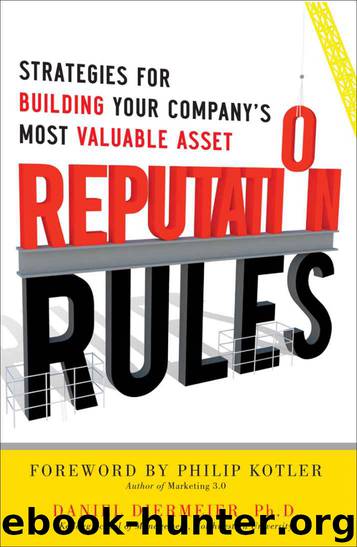Reputation Rules: Strategies for Building Your Company's Most valuable Asset by Daniel Diermeier

Author:Daniel Diermeier [Diermeier, Daniel]
Language: eng
Format: mobi
Publisher: McGraw-Hill
Published: 2011-04-11T04:00:00+00:00
RISKS AND REGULATION
As we saw in Chapters 3 and 4, a main driver of both reputational and regulatory risk is the moral judgments of both customers and noncustomers that may take action against a company with the goal of forcing it to comply with their proclaimed moral stand. In other words, we can conceptualize these values and principles as constituting the formal and informal “rules of the game” of market competition. If they perceive a violation of the rules, external stakeholders may impose costs on companies to make them change their policies and practices.
Note that these rules of the game go beyond current legally binding rules and regulations. Some countries do not prohibit a company from employing 12-year-olds in its manufacturing plants or dumping toxic waste into a river. Still, such behavior violates widely held ethical standards. Also, the rules of the game usually vary significantly from country to country and from market to market. Again, this is true not only of legal rules, but especially of ethical norms and values. Finally, the rules of the game are contested and ever-changing. Only a decade ago, concerns about animal rights did not weigh heavily on American businesses; today, food companies have extensive animal welfare policies.
These three factors (informality, cross-country variation, and change) are largely responsible for the development of crises when companies are confronted by a hostile stakeholder environment. We saw this clearly in Wal-Mart’s strategic shift in Chapter 3. Wal-Mart’s subsequent change in business practices initially reflected not a desire to differentiate itself as the socially responsible retailer, but an attempt to minimize reputational damage. To lower the long-term expected costs from reputational damage, a company “invests” in socially responsible business practices. Such an investment will improve its competitive position if the costs of complying with these practices are on average smaller than the expected savings from the avoidance of reputational damage.
In addition, companies may try to decrease the likelihood of regulatory or legal action. In the case of self-regulation, companies may “voluntarily” adopt socially responsible business practices to preempt regulation by legislatures, agencies, or the courts. The rating systems used in the entertainment industry and advertising restrictions in the spirits industry are well-known examples.
At some point, firms will be held accountable if their actions violate the commonly accepted rules of the game, whether the negative consequences are legal, regulatory, or reputational. Investors recognize these risks and incorporate them into their valuation of companies. Good corporate social performance, then, can be interpreted as an “insurance policy” against such risks. Recent research suggests that such savings can be substantial. In the case of a product recall, for example, companies with highly rated CSR records lose on average $600 million less in firm market value than companies with low CSR activities.13
Download
This site does not store any files on its server. We only index and link to content provided by other sites. Please contact the content providers to delete copyright contents if any and email us, we'll remove relevant links or contents immediately.
Nudge - Improving Decisions about Health, Wealth, and Happiness by Thaler Sunstein(7689)
Deep Work by Cal Newport(7059)
Principles: Life and Work by Ray Dalio(6413)
The Doodle Revolution by Sunni Brown(4752)
Factfulness: Ten Reasons We're Wrong About the World – and Why Things Are Better Than You Think by Hans Rosling(4730)
Eat That Frog! by Brian Tracy(4519)
Thinking in Bets by Annie Duke(4216)
Hyperfocus by Chris Bailey(4110)
Visual Intelligence by Amy E. Herman(3775)
Writing Your Dissertation in Fifteen Minutes a Day by Joan Bolker(3715)
Ogilvy on Advertising by David Ogilvy(3598)
Hidden Persuasion: 33 psychological influence techniques in advertising by Marc Andrews & Matthijs van Leeuwen & Rick van Baaren(3549)
How to Win Friends and Influence People in the Digital Age by Dale Carnegie & Associates(3543)
How to win friends and influence people by Dale Carnegie(3467)
The Pixar Touch by David A. Price(3429)
Schaum's Quick Guide to Writing Great Short Stories by Margaret Lucke(3369)
Deep Work: Rules for Focused Success in a Distracted World by Cal Newport(3222)
Work Clean by Dan Charnas(3113)
The Slow Fix: Solve Problems, Work Smarter, and Live Better In a World Addicted to Speed by Carl Honore(3001)
